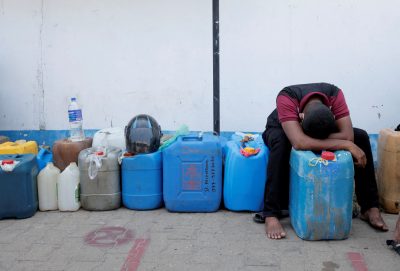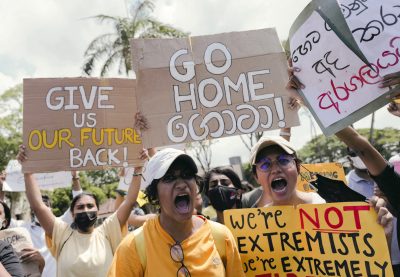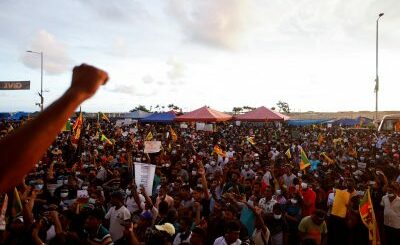Sri Lanka’s Economic Crisis is a new Opportunity for Reconciliation
Ashok Gladston Xavier (Chennai) wijst op crisissen in de wereld die onbesproken blijven. Dat is bijvoorbeeld het geval voor de crisis in Sri Lanka. De oorlog bereikte een piek in 2008-2009. Toen die oorlog voorbij was, dacht iedereen dat Sri Lanka weer ‘normaal’ zou gaan functioneren. Maar dat was niet zo. De oorlog was dan wel voorbij, maar de problemen bleven onopgelost.
De ‘Tamil-kwestie’ is er nog steeds. De Tamils, een belangrijke minderheid, bewonen het noorden en het oosten van het land en kunnen of mogen niet op gelijke voet leven met de Singalese bevolking. Een verzoening is er tot vandaag niet gekomen.
Ashok vergelijkt Sri Lanka nu met een schip dat zich heeft vastgevaren. De economische crisis van het land spreekt boekdelen. Het land kent de hoogste inflatie in 12 jaar, prijzen rijzen de pan uit en er is gebrek aan brandstof, voedsel en alles wat je voor een menswaardig leven nodig hebt.
Ashok legt uit dat de crisis niet plots opdoemde. Ze was het resultaat van het onvermogen om te plannen. Er werd sinds 2001 weinig gedaan om de inflatie onder controle te krijgen, het toerisme ging drastisch achteruit en Sri Lanka geraakte diep in de schulden.
Ashok schetst drie oorzaken voor de huidige crisis. Vooreerst deed de covidpandemie er nog een schep bovenop. De migrantenwerkers keerden naar huis terug en geraakten ook ‘thuis’ in de problemen waardoor er minder geldtransacties gebeurden.
Ten tweede bleek de overschakeling naar biologische landbouw in 2021 te drastisch. En ten derde stipt hij de terugval in de export van kleding, thee en edelstenen aan.
De regering vraagt nu hulp aan China, India, en het IMF, maar Ashok vindt het vreemd dat de rijke Tamil-diaspora niet wordt aangesproken. Als de regering haar ‘fundamentalistische en extreemnationalistische agenda’ zou verlaten, zou ze zowel verzoening als een economisch reveil kunnen bereiken.
Hieronder vind je de hele analyse van Ashok Gladston Xavier in het Engels.

As the world’s attention is spotlighted on Ukraine’s crisis the other stories around the world get missed out
The new mantra of the media is to keep focused on the most popular issue till another issue comes up. The last five years have seen a dramatic increase in conflict: Syria, South Sudan, Myanmar, Afghanistan and now it is Ukraine.
It is only a matter of time that even Ukraine is forgotten and the world moves on. The impact of these problems and crises lives for a very long time. While the focus stays on the key newsworthy conflict/crisis there are those that go unreported despite their importance.
Sri Lanka is one such crisis
Sri Lanka hogged the limelight when the war was at its peak from 2008-2009. As soon as the war came to an end many thought that the country was on its way to normalcy. What happened was that the war came to a militaristic end but the issues that contributed to conflict are still unresolved.
The key issue of the Tamil Question is still hanging out there. This means that the Tamils, a significant minority that inhabit the entire north and east of the country are not treated on par with the majority Sinhalese. The lofty promises of the war winning parties have proved to be empty words and lost opportunities for any meaningful resolutions leading to reconciliation.
A lot of water has passed under the bridge
Sri Lanka now is looking like a ship stuck in a sink hole. The economic crisis facing Sri Lanka is quite unprecedented with severe impact on its people. With the inflation levels currently at 14.2 per cent, the highest in 12 years has resulted in skyrocketing prices and acute shortage in fuel, food and consumables.
The common person is no longer able to live a normal life without worrying where the next meal will come from. The death of four people is directly attributed to the inflation. Two of them died while waiting in queues to get fuel. The non-availability of flour, cooking gas, and even basic ingredients for cooking pose a threat to meet the basic necessities of life.

This crisis was not sudden, it is a result of failing to plan that led to a planned failure. In 2021 when the inflation was already on its rise, very little was done to control it. The added burden of the COVID -19 pandemic around the world only accelerated the issues.
Sri Lanka’s tourism industry that contributed about 10 per cent that $450 billion to its $80 billion GDP, had fallen to $2 million a month in September 2021. This should have sent the alarm bells ringing. The populist measure taken by the government to cut the value added taxes by half only contributed to the growing problem. With very less money coming in and a lot of money going out the country was now dealing with a balance of payments crisis.
The heart of the matter is the drop in the foreign exchange reserve from $7.5 billion to $2.36 billion. The country has to bay about $4 billion debts by the end of June 2022. The problem of debt was continuing to knock at the doorstep of Sri Lanka as the global debt rose by 256 per cent. This has left the country unable to clear the 2000 containers with goods as it needs $35 million to clear them.

Reduction of remittances
Economists identify three major contributors to this ongoing situation in addition to the COVID-19 pandemic. The stoppage/reduction of remittances from the migrant workers especially in the Middle Eastern countries has a crucial role to play.
Owing to the pandemic many returned home and were unable to return to their workplaces or they were faced by the pandemic in the unlikely crisis in both the host and the home countries.
The migrants who contribute about $7.1 billion per year making it the highest contributor to the foreign exchange reserve ahead of the export and tourism industry were forced to reduce their money transfers.
Secondly the common factor blamed for the food shortage is the graduation of the country towards complete organic farming in 2021. From the outside the transition to complete organic farming was lauded by the world as a progressive move but a cursory analysis reveals a story different from its noble ideals.
Due to the lack of foreign exchange reserves, the country was unable to import fertilizers. The key supplier being China was not going to supply fertilizers for free. A sudden move towards organic farming has severely affected the food production leading to large scale shortages further spiking the increase of prices.

The third significant contributor is the decline in the exports. The Sri Lankan garment export market used to fetch 28.3 per cent of the total exports, the tea and precious stones were also significant contributors. The fall in the trend of about 10 per cent was noticed in 2020 but not much was done to arrest the downfall.
Debt crisis
With a $4 billion debt staring at its face, the leaders are busy doing their trips between India and China asking these countries to support them. Additionally, the country has approached the International Monetary Fund (IMF) to bail them out of this financial distress. The story of strings attached to this deal is well known to all from other similar experiences.
While all this is being done very little is being done to tap into the wealthy diaspora that is essentially of Tamil ethnicity. If the government shows a sincere commitment to resolve the ethnic issue and stop promoting its fundamentalist and ultra-nationalist agenda, it will definitely reap dual benefits of reconciliation and economic progress.
Ashok Gladston Xavier
Ashok Gladstone Xavier is associate professor in social work at Loyola College, Chennai, Tamil Nadu, India
Timeline of Sri Lanka’s worst economic crisis since independence (Aljazeera)
Thousands of Sri Lankans rally over government handling of crisis
Lees verder (inhoud april 2022)




